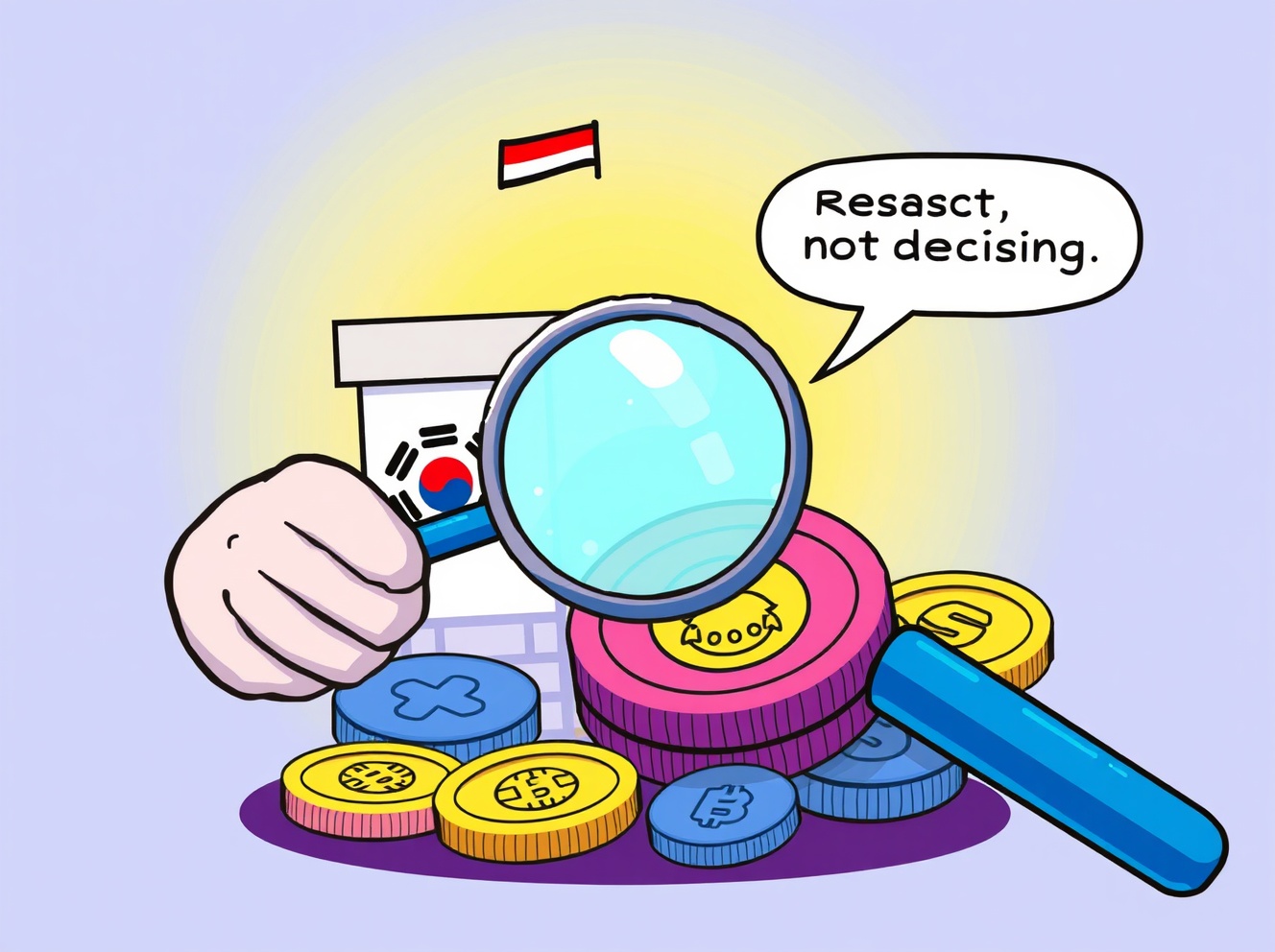
BitcoinWorld Crypto Industry Regulation: South Korea’s FTC Offers Crucial Clarification Are you keeping up with the dynamic world of digital assets? The topic of crypto industry regulation is always buzzing, and a recent development from South Korea has brought some much-needed clarity. Investors and enthusiasts alike have been closely watching the moves of regulatory bodies, especially concerning major exchanges. South Korea’s Fair Trade Commission (FTC) recently stepped forward to address swirling media reports. These reports suggested the commission was on the verge of designating prominent exchanges like Dunamu, the operator behind Upbit, and its rival Bithumb, as financial conglomerates. Such a move would have significant implications for their operations and the broader market. What Sparked the Crypto Industry Regulation Rumors? The speculation originated from a report published by the Seoul Economic Daily. This publication claimed that the South Korean government was planning to impose stricter internal control and soundness rules on operators such as Dunamu and Bithumb. The report specifically cited an upcoming FTC study as the basis for these anticipated changes, leading to considerable discussion within the crypto community. The idea of classifying these crypto exchanges as financial conglomerates is a serious matter. It would essentially place them under the same stringent regulatory framework as traditional banks and investment firms. This could mean increased capital requirements, enhanced oversight, and potentially a complete overhaul of their operational structures. However, the FTC has moved swiftly to dispel these rumors. They issued a clear statement, emphasizing that no definitive policy decisions have been made regarding the virtual asset industry. This clarification is crucial for market stability and investor confidence. The commission explicitly stated that its current efforts are focused purely on research. This research aims to gain a comprehensive understanding of both the domestic and international regulatory landscapes for business groups operating in the virtual asset space. It’s about gathering information, not implementing new rules just yet. Why Is Understanding Crypto Industry Regulation So Important? The global cryptocurrency market is still relatively nascent compared to traditional finance, yet it has grown exponentially. Governments worldwide are grappling with how best to oversee this innovative but volatile sector. South Korea, a significant player in the crypto space, often sets precedents that other nations observe. For exchanges like Upbit and Bithumb, being designated as financial conglomerates would bring a host of new obligations. These could include: Enhanced Capital Requirements: Needing to hold larger reserves to protect customer assets. Stricter Governance: Implementing more robust internal controls and corporate governance structures. Increased Reporting: More frequent and detailed financial reporting to regulatory bodies. Consumer Protection: Potentially offering new safeguards for users, similar to those in traditional banking. This level of crypto industry regulation , while offering potential benefits in terms of stability and trust, could also present significant operational challenges and increased costs for the exchanges. The FTC’s measured approach highlights a broader trend among regulators globally: the need for careful consideration before imposing sweeping new rules. Rushing into regulation without a full understanding of the technology and its implications can stifle innovation or create unintended consequences. While the immediate fear of strict new regulations has been eased, the ongoing research by the FTC signals that enhanced oversight is certainly on the horizon. This isn’t a “no regulation ever” announcement, but rather a “not yet, we’re still learning” statement. What Are the Challenges and Benefits of Crypto Industry Regulation? Navigating the path to effective crypto industry regulation involves balancing several critical factors: Challenges: Innovation vs. Control: Over-regulation can stifle the very innovation that makes crypto exciting. Global Coordination: Crypto operates borderlessly, making purely national regulations difficult to enforce effectively. Defining Crypto Assets: Regulators struggle to classify crypto—is it a security, a commodity, or a currency? Technological Complexity: Understanding blockchain and decentralized finance requires specialized expertise. Benefits: Investor Protection: Safeguarding users from fraud, scams, and market manipulation. Market Stability: Reducing extreme volatility and systemic risks. Legitimacy: Integrating crypto into the mainstream financial system, fostering wider adoption. Anti-Money Laundering (AML): Preventing illicit activities and financial crimes. For individuals and businesses involved in the crypto space, staying informed about these regulatory discussions is paramount. It allows for proactive adaptation to potential changes and helps in making informed investment and operational decisions. The Future of Crypto Industry Regulation in South Korea The recent clarification from South Korea’s FTC offers a moment of respite for the crypto market, confirming that immediate, drastic policy changes are not on the table. However, it also underscores the ongoing and serious intent of regulators to understand and potentially regulate the virtual asset industry more comprehensively. This period of research is vital for crafting effective and fair rules that can support innovation while protecting consumers and ensuring market integrity. The dialogue between industry players and regulators will undoubtedly continue to shape the future of crypto in South Korea and beyond. To learn more about the latest crypto market trends, explore our article on key developments shaping Bitcoin price action. Frequently Asked Questions (FAQs) Q1: What did the Seoul Economic Daily report claim about crypto exchanges? A1: The report claimed that the South Korean government planned to impose stricter internal control and soundness rules on major crypto exchanges like Dunamu (Upbit) and Bithumb, citing an upcoming FTC study. Q2: What is the South Korean FTC’s current stance on crypto industry regulation? A2: The FTC has clarified that it has made no policy decisions on strengthening crypto industry regulation. Its current activities are focused solely on researching the domestic and international regulatory landscape for virtual asset businesses. Q3: What would it mean for exchanges to be designated as financial conglomerates? A3: Such a designation would subject them to stringent regulations similar to traditional banks, including enhanced capital requirements, stricter governance, increased reporting obligations, and potentially new consumer protection measures. Q4: Why is the FTC taking a research-first approach to crypto industry regulation? A4: A research-first approach allows the FTC to thoroughly understand the complexities of the virtual asset industry, its domestic and international implications, and the potential impact of various regulatory frameworks before implementing any new policies. This helps in crafting more effective and balanced regulations. Q5: How does South Korea’s approach compare to other countries? A5: Many countries are also in various stages of developing their crypto regulatory frameworks, with some adopting stricter rules while others focus on innovation. South Korea’s careful, research-driven approach reflects a global trend of cautious engagement with this evolving sector. Did you find this update on South Korea’s crypto industry regulation helpful? Share this article with your network on social media to keep others informed about these crucial developments. Your insights help us foster a more knowledgeable crypto community! This post Crypto Industry Regulation: South Korea’s FTC Offers Crucial Clarification first appeared on BitcoinWorld .
Bitcoin World
You can visit the page to read the article.
Source: Bitcoin World
Disclaimer: The opinion expressed here is not investment advice – it is provided for informational purposes only. It does not necessarily reflect the opinion of BitMaden. Every investment and all trading involves risk, so you should always perform your own research prior to making decisions. We do not recommend investing money you cannot afford to lose.
Revolutionary Tinder AI Scans Your Camera Roll Photos to Find Perfect Matches

BitcoinWorld Revolutionary Tinder AI Scans Your Camera Roll Photos to Find Perfect Matches Tinder is deploying advanced Tinder AI technology that could fundamentally change how dating apps understand user preferences. In a bold move to reverse nine consecutive quarters of declining paying users, the popular online dating platform now wants permission to access your Camera Roll photos to learn about your personality and interests. How Tinder AI Transforms Dating App Experience Match Group , Tinder’s parent company, revealed during their recent earnings call that they’re testing a feature called ‘Chemistry’ that uses artificial intelligence to create better matches. The system works by asking users interactive questions and, with explicit permission, analyzing photos stored in their phone’s Camera Roll. This represents a significant evolution in how dating apps leverage personal data to improve user experience. Camera Roll Photos: The New Frontier in Online Dating The concept behind analyzing Camera Roll photos is simple yet powerful. If you have numerous photos of hiking adventures or rock climbing expeditions, the Tinder AI system would identify these patterns and potentially match you with partners who share similar outdoor interests. This approach moves beyond superficial swiping toward more meaningful connections based on genuine lifestyle compatibility. Privacy Concerns in Modern Dating Apps While the potential benefits are intriguing, the privacy implications are substantial. Match Group isn’t alone in requesting expanded access to personal media – Meta recently launched similar features for AI photo editing. However, critics question whether the benefits justify the privacy trade-offs, especially when the company’s primary motivation appears to be reversing declining revenue rather than purely enhancing user experience. Match Group’s Financial Challenges and AI Solutions The push for advanced Tinder AI features comes at a critical time for Match Group . The company reported: 9 straight quarters of paying user declines 3% year-over-year revenue decrease for Tinder 7% decline in paying users $14 million negative impact on revenue from product testing Despite these challenges, Match Group continues investing heavily in AI across multiple areas of their dating apps ecosystem. Beyond Camera Roll: Tinder’s Comprehensive AI Strategy The Chemistry feature represents just one component of Tinder’s broader AI initiative. The company has also implemented: AI Feature Function Current Status Message Nudges LLM-powered system warns before sending potentially offensive messages Active Photo Selection AI helps users choose their most appealing photos Active Chemistry Testing Analyzes user responses and Camera Roll content Pilot in NZ/Australia The Future of Online Dating: AI-Powered or Privacy-Invasive? As Tinder AI continues evolving, the online dating landscape faces fundamental questions about data privacy versus match quality. While AI promises more compatible connections through deeper understanding of user preferences, the requirement to access personal Camera Roll photos raises legitimate privacy concerns that could determine user adoption rates. FAQs About Tinder’s AI Features What is Tinder’s Chemistry feature? Chemistry is an AI-powered feature that analyzes user responses and Camera Roll photos to improve match recommendations. How does Match Group use AI in dating apps? Match Group employs AI for message moderation, photo selection, and now personality analysis through the Chemistry feature. Are my Camera Roll photos safe with Tinder? Tinder requires explicit permission to access photos and claims data is used solely for match recommendations, though users should review privacy policies carefully. Who leads Tinder’s AI initiatives? Under Spencer Rascoff , Match Group CEO, Tinder is making AI a central pillar of their 2026 product roadmap. How does this compare to other social platforms? Similar to Meta ‘s recent AI features, Tinder’s approach represents the growing trend of social platforms using personal content for AI analysis. The integration of Tinder AI represents a transformative moment for online dating . While the technology promises more meaningful connections through analysis of Camera Roll photos and user behavior, it also raises important questions about privacy boundaries in modern dating apps . As Match Group navigates these challenges, the success of their AI initiatives could determine whether traditional swipe-based dating apps can adapt to changing user expectations and competitive pressures. To learn more about the latest AI technology trends in social applications, explore our article on key developments shaping AI features and their impact on user experiences across digital platforms. This post Revolutionary Tinder AI Scans Your Camera Roll Photos to Find Perfect Matches first appeared on BitcoinWorld . Bitcoin World

Bitcoin Drives $250 Billion Crypto Market Drop Amid Volatility and Liquidations
The cryptocurrency market experienced a sharp decline today, with over $250 billion wiped from its total market capitalization. This drop primarily impacted Bitcoin and Ethereum, driven by high liquidation events Bitcoin World











